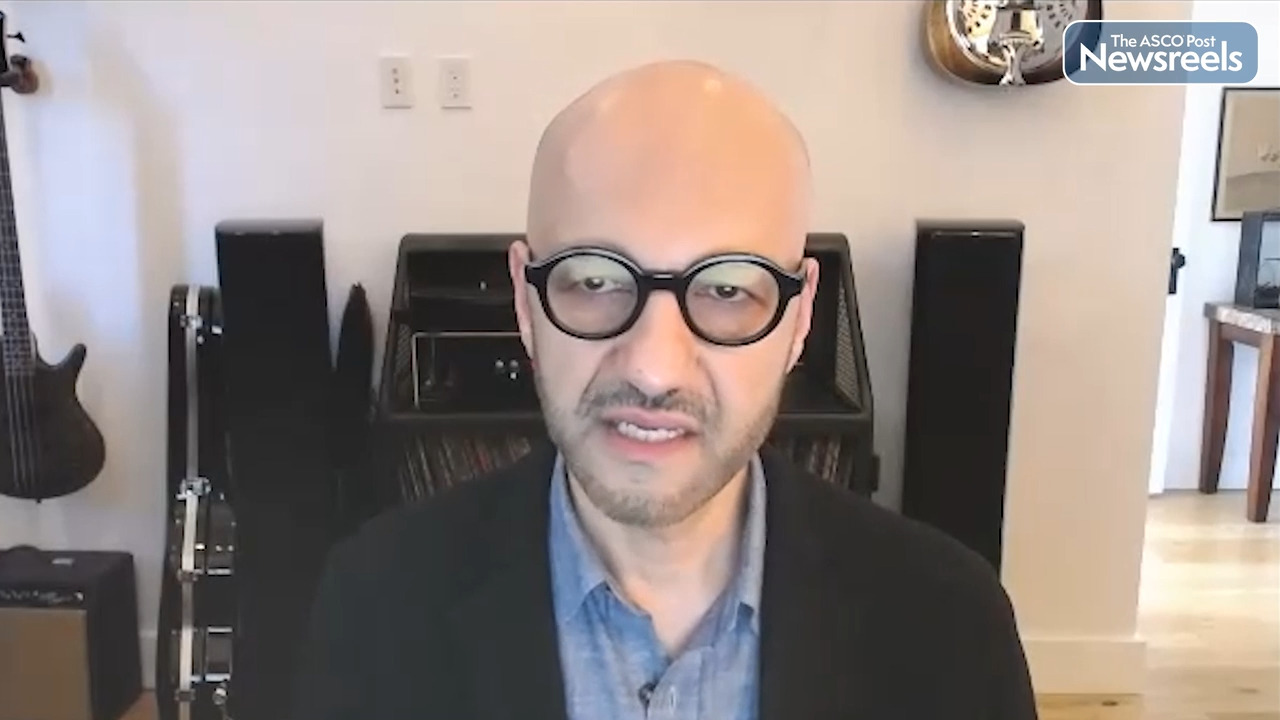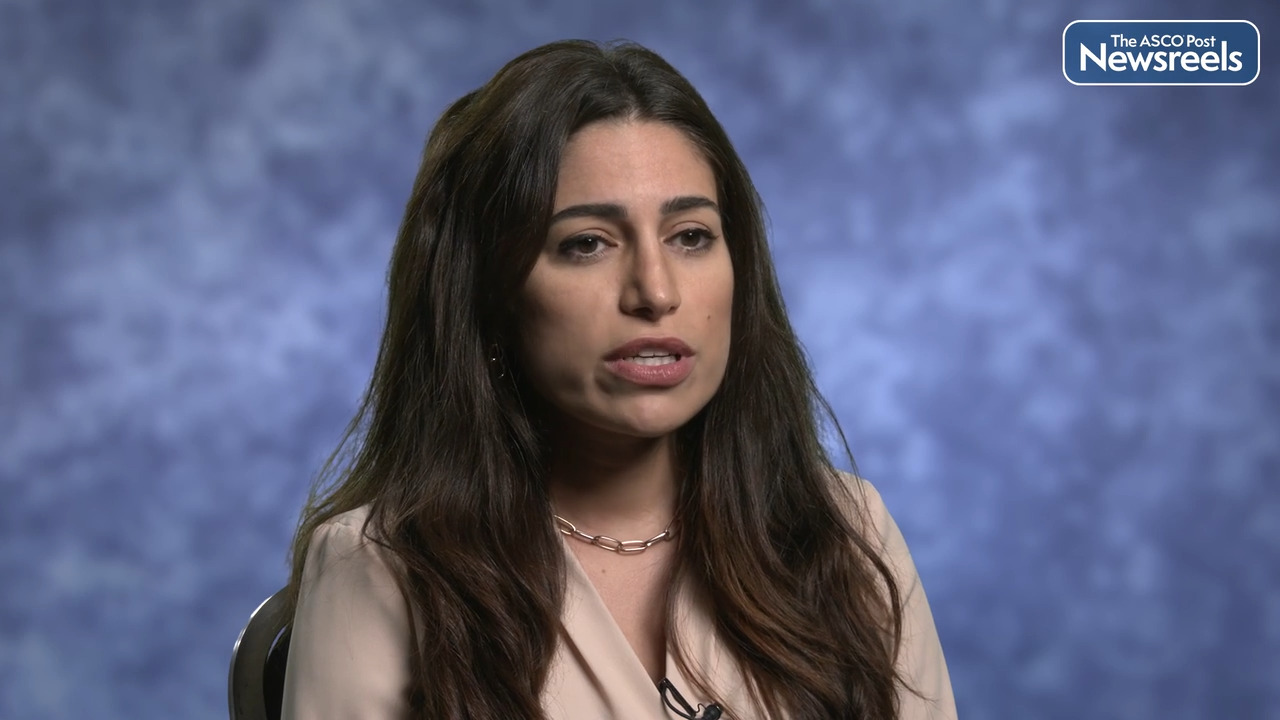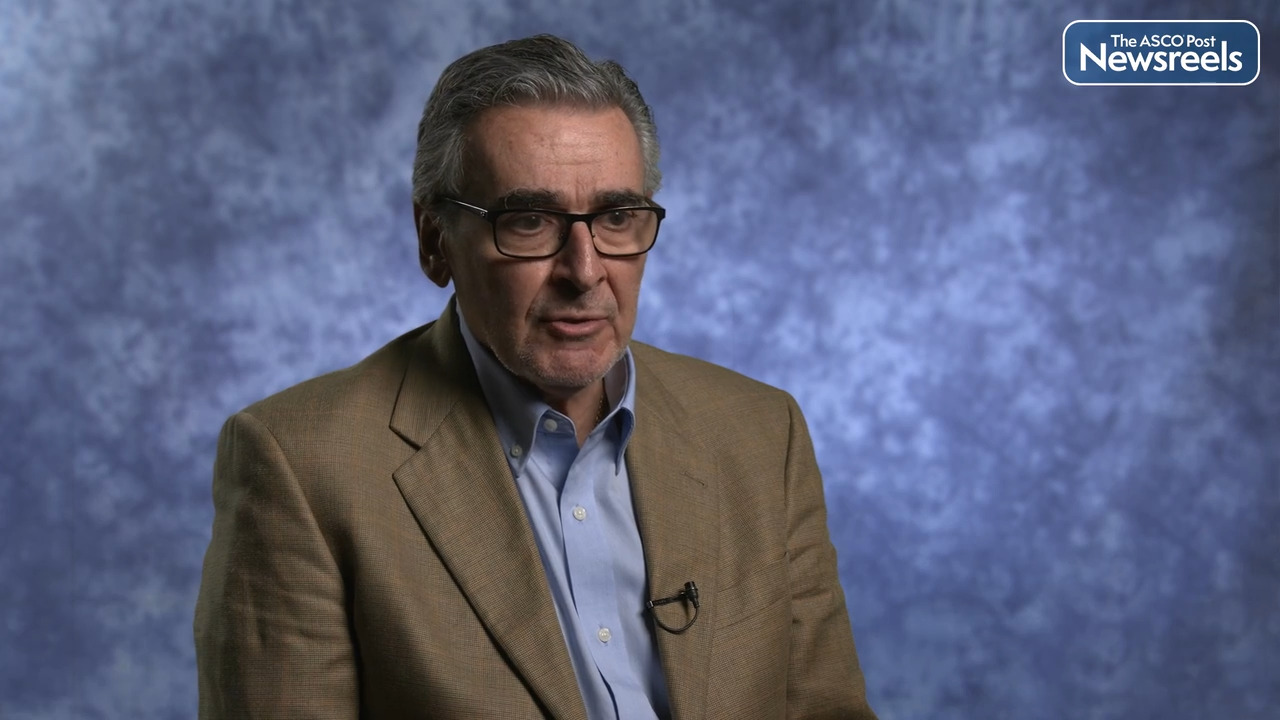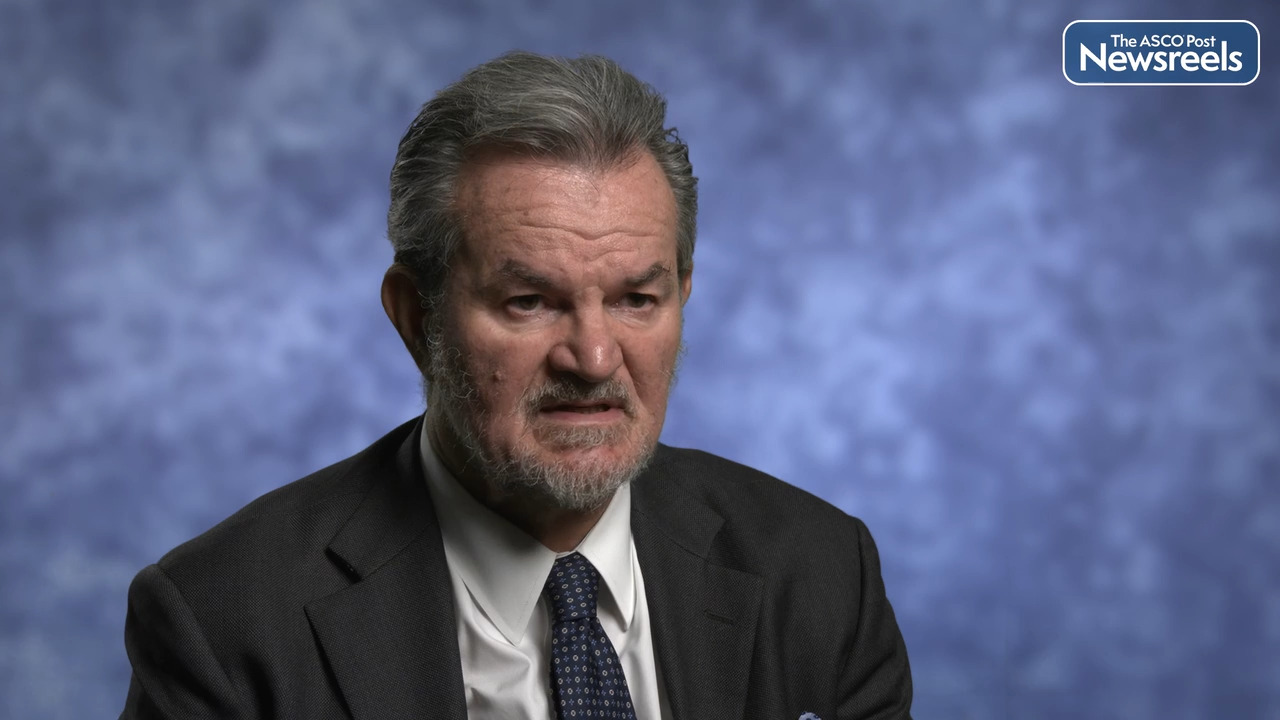Nicholas C. Turner, MD, PhD, on New Data on Capivasertib and Fulvestrant for Advanced Breast Cancer
2022 San Antonio Breast Cancer Symposium
Nicholas C. Turner, MD, PhD, of London’s Institute of Cancer Research and The Royal Marsden, discusses phase III results from the CAPItello-291 clinical trial, which showed that in patients with hormone receptor–positive, HER2-negative tumors resistant to aromatase inhibitors, adding the investigational AKT inhibitor capivasertib to fulvestrant doubled the median progression-free survival compared with placebo plus fulvestrant (Abstract GS3-04).
Transcript
Disclaimer: This video transcript has not been proofread or edited and may contain errors.
AKT inhibition is common in advanced hormone receptor positive HER2 negative breast cancers. The CAPitello 291 study investigated the AKT inhibitor, capivasertib. The study recruited patients with advanced hormone receptor positive HER2 negative breast cancer that had progressed on prior aromatase inhibitor. The study allowed up to two prior lines of endocrine therapy and one prior line of chemotherapy for advanced breast cancer, and also allowed prior CDK4/6 inhibitor, mandating 51% of patients to have had a prior CDK4/6 inhibitor at least.
708 patients were recruited, randomized one to one between fulvestrant and placebo and fulvestrant and capivasertib. There were two co-primary endpoints. Investigator assessed PPFs overall and in AKT pathway activated cancers. AKT pathway activated cancers were defined as the presence of PIC3CA, AKT1, or P10 mutations in the cancer, which was determined in tissue, which was submitted after randomization and analyzed with the FoundationOne assay.
Overall, 41% of tumors had AKT pathway activating alterations. Overall, median PFS improved from 3.6 months on fulvestrant and placebo to 7.2 months on capivasertib and fulvestrant. A hazard ratio of 0.6, highly statistically significant.
Then in the co-primary endpoint of AKT pathway activated cancers, PFS improved from 3.1 months on placebo to 7.2 months on capivasertib. A hazard ratio of 0.5. Again, highly statistically significant.
If we come to adverse effects, overall capivasertib was well tolerated with a manageable safety profile. 13% of patients stopped due to adverse effects. The most prominent adverse effect was diarrhea, which occurred in 72% of patients, predominantly grade one diarrhea, although 9% of patients had grade three diarrhea. Rash also occurred in 38% of patients, 12% grade three, but prominently both hypoglycemia and stomatitis were relatively uncommon, grade three and only 2% of patients each.
Overall the CAPitello 291 study showed a statistically significant and clinically meaningful improvement in progression-free survival, both overall and in AKT pathway activated cancers. The benefit was consistent across subgroups including in patients with prior CDK46 inhibitor use. Currently, overall survival data is immature and ongoing follow-up is going on for two further formal analyses of overall survival.
In conclusion, it is hopeful that capivasertib will be a future treatment option for the population of patients who were recruited in the study.
The ASCO Post Staff
Sean Khozin, MD, MPH, of the Massachusetts Institute of Technology, discusses the “external validity deficits” of randomized clinical trials, which still involve only about 5% of adults with cancer, who may differ in important ways from real-world populations. Dr. Khozin describes the reasons for low levels of participation and advocates for capturing the experience of patients not represented in traditional clinical trials, so real-world data can address these validity deficits.
The ASCO Post Staff
Yara Abdou, MD, of the University of North Carolina, discusses results from the RxPONDER SWOG S1007 study, which showed that non-Hispanic Black women with hormone receptor–positive/HER2-negative breast cancer with one to three involved lymph nodes and a recurrence score of ≤ 25 have worse outcomes than non-Hispanic White women. In addition, Black patients were more likely to accept treatment assignment than their White counterparts and were just as likely to remain on estrogen therapy at 6 and 12 months, suggesting that outcome differences may be less likely attributable to lack of treatment compliance within the first year (Abstract GS1-01 ).
The ASCO Post Staff
Marleen Kok, MD, PhD, of the Netherlands Cancer Institute, discusses the most important advances in early breast cancer treatment during the past year for patients with triple-negative, HER2-positive, and estrogen receptor–positive disease. Dr. Kok also addresses long-term treatment toxicities and quality of life.
The ASCO Post Staff
Joseph A. Sparano, MD, of the Tisch Cancer Center at Mount Sinai Health System, discusses long-term clinical outcomes data that continue to show many women with early breast cancer can safely forgo chemotherapy, when guided by the 21-gene recurrence score result. The longer follow-up also showed that recurrences of breast cancer continue to occur years after the original diagnosis, although these recurrences were not prevented by chemotherapy use. Racial disparities were not explained by inequities in social determinants of health or treatment adherence, with Black women at higher risk of early recurrence within the first 5 years of diagnosis, but not later recurrence after 5 years (Abstract GS1-05).
The ASCO Post Staff
Andrea De Censi, MD, PhD, of Italy’s E.O. Ospedali Galliera, discusses phase III findings showing that low-dose tamoxifen (so-called babytam) given for 3 years still significantly prevents recurrences from noninvasive breast cancer after a median of 7 years from treatment cessation. Babytam at 5 mg/d for 3 years significantly lowered recurrence from noninvasive breast cancer at 10 years without “excess” adverse events (Abstract GS4-08).





